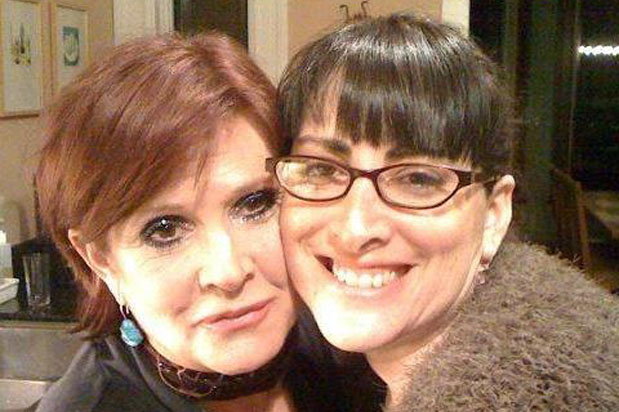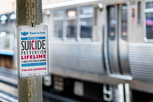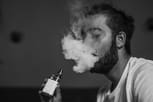Life wasn’t going so well for Mara Shapshay in 2005. She was sober, unemployed, kicked out of the house by her gay husband and sleeping in her car. The only thing that could have possibly been worse was if she was caught at her bottom by her childhood hero. And yet, that’s exactly what happened to Shapshay when she bumped into Carrie Fisher at an AA meeting.
It was an unlikely pairing but as she rambled on about her life, Shapshay soon discovered that she and the Hollywood icon were not only residing in the same galaxy, they were both fighting the same side of the Force. They were both dual diagnosis; they both married gay men by accident; they were both comedy writers; and they both viewed the situation as only true comedians could—wickedly hilarious. After that initial conversation, Fisher offered Shapshay to move in with her, a move that both saved Shapshay’s life and sprouted a deep friendship.
On Tuesday, Shapshay will be starting a conversation with the rest of us in honor of Fisher. As producer and host of This is My Brave’s first-ever Variety Show, Shapshay, along with other comedians and musicians, will be sharing her story of mental illness and addiction in order to raise awareness for mental health. Carrying out Fisher’s legacy of mental health advocacy is the least Shapshay can do for a woman who has touched her life and millions of others. “Everything I do, I do for Carrie,” Shapshay says, “and so all shows are dedicated to her and it’s all in the name of dual diagnosis and raising awareness.”
Below is our conversation with Mara Shapshay.
It hasn’t even been a year since Carrie’s passing. Do you feel like you’re still fresh in the grieving period?
You know, just the other week, the story of her sending a cow’s tongue to a producer brought it all back up again because she really went to bat for me once and I was like, that’s what she does for people that she fiercely loves. So I’ll be doing okay and getting over it, and then someone will send me something or something will remind me of her and I will just fall apart all over again.
I read in an interview that you said that you and Carrie lost touch in the later part of her life.
Yeah. My life became busy. I got married again and we just sort of lost touch, but she always has a special place in my heart. I don’t know, I think it happens. I think a lot of it too is I got well and Carrie struggled with sobriety and struggled with her mental illness. It was a challenge to be around sometimes. So I understand why.
Your bio says that you are over 12 years clean and sober. Is that the latest?
Yeah. I’m 12 and a half.
What do you think was the biggest contributor of you progressing in your recovery?
I would say spirituality. My connection to my Higher Power and seeking spiritual life.
For some, that is strictly tied to a faith. For others, it’s more general. What does Higher Power mean for you?
Well, like Bill Wilson says in the Big Book, you choose your own conception of God. When I grew up, we started off Orthodox Jewish but then became conservative and then reformed, but I went back to my religion, as it also says in the Big Book. And then I also go to Self-Realization Fellowship, so Paramahansa Yogananda was a big part of my spiritual quest and I ended up sleeping next to the Dalai Lama for a week, so there’s some Buddhism in there. I choose my own kind of path but I feel like these spiritual giants have been put in my path and I just follow what I’m being guided to do by my Higher Power. It’s a combination of a lot of things.
It seems like your whole journey has been a combination of a lot of things.
[Laughing] Yes. As they say, “The harder the road, the higher the purpose,” I think. So it’s been a very hard road, but I don’t think I would have sought the spiritual life had it not been that way. Had I gotten everything that I wanted which was like, you know, the writing career, the family, the everything, and I got that right away, I would never have sought this spiritual path.
And as far as your work in standup comedy goes, what role has humor played in your recovery?
Oh my God. If I didn’t laugh at things, I would probably be suicidal. It’s so important to be able to laugh and as Carrie would say, “Take your pain and make it into art.”
I was a comedy writer before I got sober, and I was writing for other comedians—but when I got sober, they were like, well, why don’t you try it yourself? I go, Really? I can’t do this. And I remember taking a class and we performed at the Comedy Store and I did really well, and my second gig ever was at the main stage of Comedy Store. It just grew from there. You never know what you’re going to do in sobriety. You say “Yes” to everything and see where it leads you.
The This is My Brave Los Angeles show is marketed as the first-ever variety show. Can you explain how that’s different from the typical show that it puts on?
Well the typical show that This is My Brave puts on is usually with people who are not professionals. So they’re not professional comics or professional musicians. They’re just people with mental illness who bravely tell their story, which is great. But that doesn’t work in LA. [Laughing]
True.
People want to see celebrities, you know, you got the industry here. So it’s a little different. So we’re using professionals, we’re using people who are stand-up comics who are sober and people who are successful musicians and spoken word, you know. So we’re doing it all— people who are either sober, have mental illness, or both. So they’re still telling their story, but it’s a little more polished, I would say. Not saying that the other kind of show is bad—I think those shows are great—just not sure that they do all that well in LA.
Yeah, so it’s catering a bit more to a crowd who is used to consuming a certain type of entertainment or structure.
Yeah, and unfortunately, with that sort of structure, you know, more celebrity-driven, you’re going to get more press. It’s better for the platform; it’s better to get the word out.
People may not understand just how brave a person has to be in order to tell his or her story. Can you recall how it was like for you when you first uttered the words “I’m an alcoholic” in truth?
Oh God. Well, I had to admit it to myself—say it to myself—first. But, telling my family, telling other people, it was embarrassing. You know, you’re admitting that you have failed deeply on a very profound level in life and you’re an alcoholic. And when you’re new in sobriety, you’re kind of, like, ashamed of yourself, and then it becomes something that’s, “Oh my God, this is the best thing about me.”
But mental health hasn’t gotten there yet. People are still ashamed. There’s still a lot of stigma. Like 1 in 5 people have a mental illness and still nobody really wants to get help. Nobody wants to talk about it. I’d rather say that I’m an alcoholic than I have mental illness. So we’ve got a long way to go and we really need to tell our stories and say, “It’s okay, I have mental illness. I have addiction. I can talk about it. I can laugh about it. And so can you. So let’s all get together and get help and help each other. Let’s not keep this in the darkness anymore.”
So for you right now in recovery, is there one that you feel like you have to protect a little more so than the other?
I would say that I am more protective over my AA program just because that’s life or death for me. Mental illness I feel I’ve been treating that, but I’ve treated them both at the same time. And I feel like the spiritual solution for me has been the one that’s worked. I’m not on any medication right now. But the spiritual solution of trying to be as present as possible and knowing that I don’t have control over anything has been key.
As you mentioned, a part of recovery is not having everything planned out. But do you have a rough draft of what you’d like to get done in the next five years?
Well, personally, I’d like to start a family, which I have been trying to do but now it looks like it’s going to be a reality. And professionally, I’m going to be writing a book called “America’s Got Mental Illness,” a take on “America’s Got Talent,” of interviews and essays of celebrities with mental illness. And I’m going to be doing a mental health comedy tour and possibly a television show. So a lot of stuff is on the horizon, but the book is the next thing I’m doing. But everything that I’m doing is to raise awareness and to end the stigma of mental illness and addiction. I feel like that’s my purpose, and I feel like—that I’m trying to really keep Carrie’s legacy alive.
And, finally, what do you think Carrie would say to the audience if she was at the This is My Brave show tomorrow?
Well, she probably will want to give a big finger to Harvey Weinstein.
Oh, yes.
But, I think she’d want everyone to be like, “You know what, just admit it. Just admit that you’ve got mental illness. Talk about it. Get it out there. Tell your story. Just laugh about it. You know, lighten up.”
The This is My Brave Variety Show will be held at the Comedy Store in West Hollywood at 8 p.m. Tuesday, November 11, 2017. Tickets may purchased here or at the door for $25.








